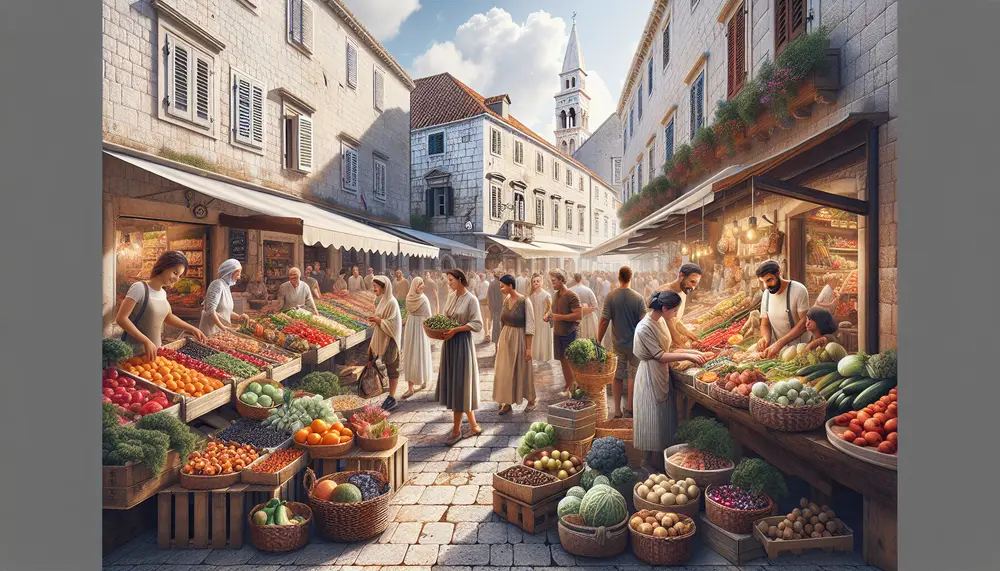Table of Contents:
Introduction to Food Retail Croatia
When it comes to food retail in Croatia, the landscape is as diverse as the country's stunning coastline. From bustling supermarkets to quaint local markets, Croatia offers a rich tapestry of shopping experiences. Whether you're a resident or a visitor, understanding the retail environment can enhance your culinary adventures.
In Croatia, food shopping is not just about purchasing necessities; it's a cultural experience. The country boasts a mix of international chains and local stores, each offering unique products and services. This blend provides shoppers with a variety of choices, catering to different tastes and preferences.
As you explore the food retail scene in Croatia, you'll notice the influence of both traditional and modern elements. This fusion creates a shopping environment that is both familiar and exciting, making every trip to the store an opportunity to discover something new.
Comparing Major Supermarkets in Croatia
In Croatia, several major supermarkets dominate the food retail landscape, each offering distinct advantages. Understanding these differences can help you make informed choices when shopping for groceries.
Konzum is one of the largest and most popular chains, known for its wide range of products and convenient locations. Shoppers appreciate its consistent pricing and frequent promotions.
Plodine is another significant player, often praised for its extensive product variety, especially in larger stores. It is a go-to for those seeking diverse options, from fresh produce to household items.
Lidl and Kaufland are international chains that have successfully established themselves in Croatia. Lidl is renowned for its competitive prices and weekly special offers, while Kaufland is favored for its spacious stores and broad selection of international goods.
Lastly, Spar and Studenac Market cater to specific needs, with Spar focusing on quality and Studenac providing convenience in smaller towns and coastal areas.
Each supermarket has its unique strengths, so exploring them can enhance your food shopping experience in Croatia.
Pros and Cons of Food Shopping in Croatia
| Aspect | Pros | Cons |
|---|---|---|
| Variety of Choices | Diverse options from international chains and local markets. | Can be overwhelming and time-consuming to explore all options. |
| Local Products | Emphasis on regional goods supports local producers. | Might not always find specific international brands. |
| Shopping Experience | Cultural experience with traditional and modern elements. | Regional differences can make product availability inconsistent. |
| Prices | Competitive pricing in rural areas with available local products. | Higher prices in tourist areas along the coast. |
| Loyalty Programs | Discounts and offers enhance value for frequent shoppers. | Loyalty program deals can vary, influencing actual savings. |
Unique Retail Features in Croatia
The food retail scene in Croatia is characterized by several unique features that set it apart from other countries. These elements contribute to a shopping experience that is both engaging and reflective of the local culture.
- Local Products: Croatian supermarkets often emphasize regional products, showcasing local wines, cheeses, and olive oils. This focus on local goods supports small producers and offers shoppers a taste of Croatia's rich culinary heritage.
- Seasonal Offerings: Many stores adjust their product lines based on the season, providing fresh, in-season fruits and vegetables. This practice not only ensures quality but also promotes sustainable consumption.
- Customer Loyalty Programs: Supermarkets like Konzum and Plodine offer loyalty programs that reward frequent shoppers with discounts and special offers, enhancing customer satisfaction and retention.
- In-Store Bakeries: It's common to find in-store bakeries in Croatian supermarkets, offering freshly baked bread and pastries. This feature adds a delightful aroma to the shopping experience and provides customers with fresh options daily.
These features make food shopping in Croatia a unique experience, blending convenience with cultural richness.
Local Markets: A Taste of Tradition
For those seeking an authentic Croatian experience, local markets offer a delightful journey into the heart of the country's culinary traditions. These markets are not just places to buy food; they are vibrant hubs of community life where tradition meets daily life.
Local markets, often found in city centers and small towns, provide a wide array of fresh produce, meats, and artisanal products. Vendors proudly display their goods, ranging from colorful fruits and vegetables to homemade cheeses and cured meats. The emphasis on fresh, locally sourced products ensures quality and supports regional farmers.
Visiting a local market is also a social experience. It's common to see locals engaging in friendly banter with vendors, exchanging recipes, and sharing stories. This interaction adds a personal touch to shopping, making it more than just a transaction.
For visitors, these markets offer a chance to immerse themselves in Croatian culture. Tasting local specialties and interacting with vendors provides insights into the country's culinary landscape and traditions.
Whether you're looking for fresh ingredients or simply want to soak in the atmosphere, local markets in Croatia offer a taste of tradition that is both enriching and enjoyable.
Price and Product Differences Across Regions
In Croatia, the food retail landscape is marked by noticeable price and product differences across various regions. These variations are influenced by factors such as local demand, availability of products, and regional economic conditions.
Coastal areas, popular with tourists, often have higher prices compared to inland regions. This is particularly evident during the tourist season when demand surges. However, these areas also offer a wider selection of international products, catering to diverse tastes.
In contrast, inland regions, especially rural areas, tend to have lower prices. Here, the focus is more on local products, reflecting the agricultural nature of these areas. Shoppers can find fresh produce and traditional Croatian goods at competitive prices.
Product availability also varies. Coastal supermarkets might stock more seafood and Mediterranean items, while inland stores emphasize meats and dairy products. This regional specialization allows shoppers to enjoy the best of what each area has to offer.
Understanding these regional differences can help you make informed choices, whether you're seeking specific products or looking to manage your budget effectively while shopping in Croatia.
Tips for an Enjoyable Shopping Experience
Shopping for food in Croatia can be a delightful experience if you know how to navigate the local retail scene. Here are some tips to enhance your grocery shopping adventures:
- Plan Ahead: Before heading out, make a list of what you need. This helps you stay focused and avoid impulse buys, especially when tempted by the array of local specialties.
- Explore Different Stores: Don't limit yourself to one supermarket. Each store offers unique products and deals. Exploring different supermarkets can lead to discovering new favorites.
- Visit Local Markets Early: If you're heading to a local market, try to go early in the morning. This is when vendors have the freshest produce, and the selection is at its best.
- Engage with Vendors: Whether in a supermarket or a local market, don't hesitate to ask questions. Vendors and staff can offer valuable insights into the best products and current deals.
- Take Advantage of Loyalty Programs: Sign up for loyalty programs at major supermarkets. These programs often provide discounts and special offers, making your shopping more economical.
By following these tips, you can make your food shopping experience in Croatia both enjoyable and efficient, allowing you to savor the best of what the country has to offer.
Conclusion: Navigating the Croatian Retail Landscape
Navigating the Croatian retail landscape offers a unique blend of tradition and modernity. With a variety of supermarkets and local markets, shoppers have access to a diverse range of products that cater to different tastes and preferences.
Understanding the regional differences in prices and product availability can enhance your shopping experience, allowing you to make informed choices that suit your needs and budget. By exploring both major supermarkets and local markets, you can enjoy the best of Croatian cuisine and culture.
Embracing the local shopping customs, such as engaging with vendors and taking advantage of loyalty programs, can further enrich your experience. Whether you're a resident or a visitor, the vibrant food retail scene in Croatia is sure to offer something special for everyone.
In conclusion, with a little planning and exploration, you can navigate the Croatian retail landscape with ease, enjoying all the culinary delights this beautiful country has to offer.
FAQ about Food Shopping in Croatia
What are the main supermarkets in Croatia?
The main supermarkets in Croatia include Konzum, Plodine, Lidl, Kaufland, Spar, and Studenac Market, each offering a unique range of products and services.
How do supermarket prices vary across regions in Croatia?
Prices in Croatian supermarkets can vary by region, with coastal areas typically having higher prices due to tourism, while inland regions often offer lower prices with a focus on local products.
What makes local markets a unique shopping experience in Croatia?
Local markets in Croatia offer a taste of tradition with fresh, locally sourced produce and artisan products. They are social hubs where locals interact with vendors, providing an authentic cultural experience.
What are some unique features of Croatian supermarkets?
Croatian supermarkets often emphasize local products, seasonal offerings, and feature in-store bakeries. Loyalty programs are also common, rewarding frequent shoppers with discounts and special offers.
How can I enhance my shopping experience in Croatia?
To enhance your shopping experience in Croatia, explore different stores, engage with vendors, visit local markets early for fresh produce, and take advantage of loyalty programs for discounts.





